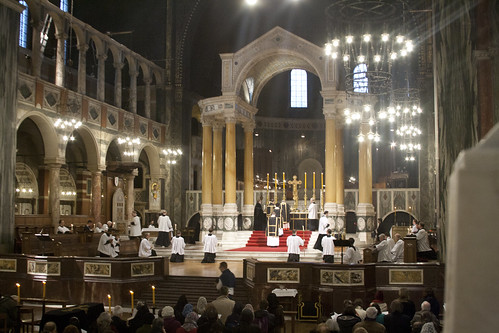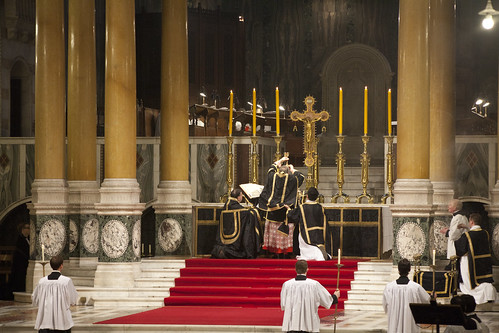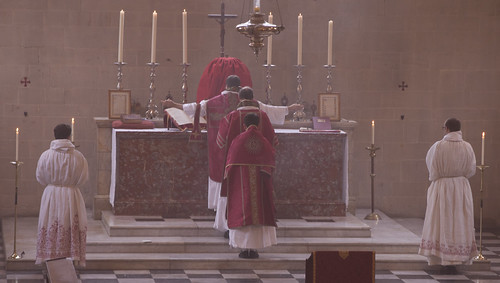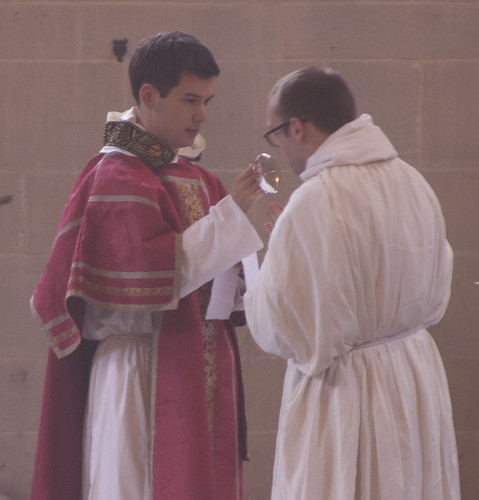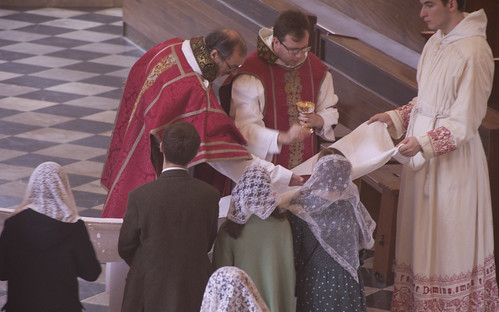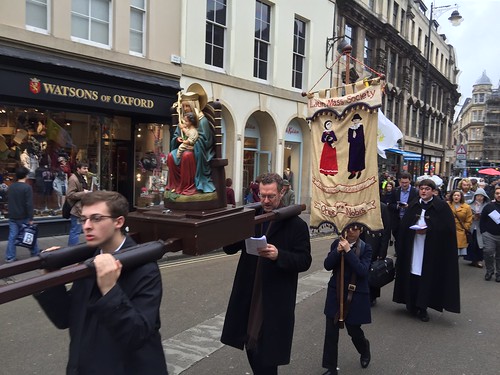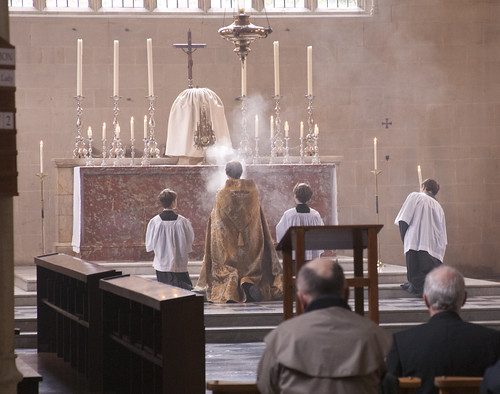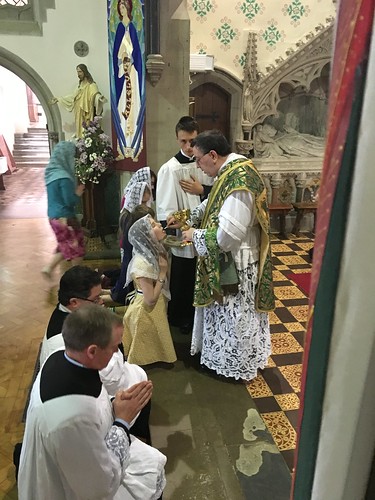Chairman's Blog
Westminster Cathedral EF Requiem this Saturday
On Saturday, 5th November 2016, the Latin Mass Society will have its Annual Requiem Mass in Westminster Cathedral at 2.00pm. This will be celebrated by Bishop Mark Jabalé O.S.B., Emeritus Bishop of Menevia. The MC will be Canon Poucin de Wouilt ICKSP.
Photos from last year's Mass, celebrated by Raymond, Cardinal Burke.
Support the work of the LMS by becoming an 'Anniversary Supporter'.
Annual Requiem in St Benet's Hall
Support the work of the LMS by becoming an 'Anniversary Supporter'.
LMS Oxford Pilgrimage - and the fruits of the Reformation
The LMS Pilgrimage to Oxford last Sat honoured the four martyrs of 1589 who died on the Town Gallows, now marked with a plaque: two priests and two laymen who had protected them.
More than 70 attended a Dominican High Mass in Blackfriars celebrated by the recently ordained Fr Oliver Keenan OP, assisted by Fr Richard Conrad OP and Br Joseph Bailham OP as deacon and sub.
Fr Daniel Lloyd of the Ordinariate led the procession through the streets, while we sang the Great Litany, the Te Deum, Faith of Our Fathers, and other things.
The day ended with Benediction of the Blessed Sacrament.
Support the work of the LMS by becoming an 'Anniversary Supporter'.
Sewing Retreat with the Guild of St Clare
This is the first such event, and I'm delighted to advertise it here: a retreat, with spiritual conferences and daily Traditional Mass, with the opportunity for confession, for people wanting to do some sewing, particularly on liturgical items. Friday 10th to Sunday 12th February
You can book here.
 |
| The priory at Boars Hill |
 |
| Bring your pocket money! |
 |
| Amanda's liturgical goldwork, begun at the Royal School of Needlework and since completed |
Support the work of the LMS by becoming an 'Anniversary Supporter'.
On Gossip and cults
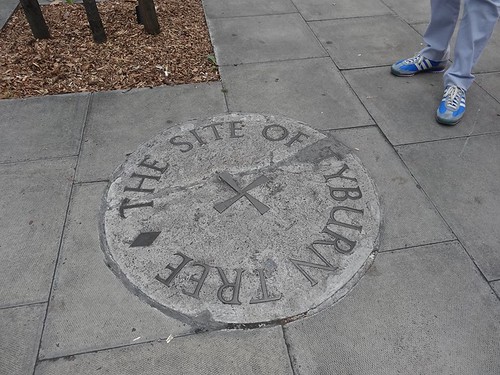 |
| Where 105 Catholics became victims of tyranny. |
This short passage in a book I'm reading struck me as worth sharing. The subject is cults--groups using psychological techniques to exploit their members for an ulterior goal (usually the enrichment of the founder).
In many groups, there is a "no gossip" or "no nattering" rule which keeps people from expressing their doubts or misgivings about what is going on. This rule is usually rationalized by saying that gossip will tear apart the fabric of the group or destroy unity, when in reality the rule is a mechanism to keep members from communicating anything other than positive endorsements.
M.T. Singer, Cults in Our Midst, pp69-70
Cults often defend themselves by pointing out superficial similarities with hierarchical and authoritarian organisations such as elite military units or traditional religious groups. This is one of the things which help one tell them apart. In the military, having the same things to complain about is actually one of the mechanisms by which recruits bond together as a unit; in cults care is taken to prevent communication, and the development of fellow-feeling, among them. I can't speak for other religions, but in the Catholic Church we are encouraged to 'manifest our concerns' not only up the chain of command--if we want to think in such terms--but horizontally. Canon 212: [the laity] have the right also to make their views known to others of Christ's faithful.
Reading about the horror of cults, whether religious, New Age, or based around get-rich-quick schemes or communication with Extra Terrestrials, makes me grateful for the things which prevent the Church from heading even a little in that direction. Another very important aspect is that all established religions have an objective tradition to which members can appeal, and against which the whims of their superiors can be judged and criticised. Religions which re-write their core texts, or let portions of them slip down the memory hole (or, even worse, don't have such texts), are treading a very dangerous path, because they are making the views of their current leaders the final court of appeal, not just in a disciplinary sense (which may be inevitable), but morally and rationally, for sincere members. At that point you are no longer struggling, with the help of the institutional leadership, to live a set of objective ideals, but are becoming the pawns, the playthings, of the leadership. This leadership may be benign, but isn't impeccable, and can easily, in the absence of constraints, become megalomaniacal, even if it didn't start that way.
Support the work of the LMS by becoming an 'Anniversary Supporter'.
Patriarchy, weediness, and neo-conservatism
Thinking about the ongoing debate on marriage, I thought I'd repost this, from Februrary 2016.
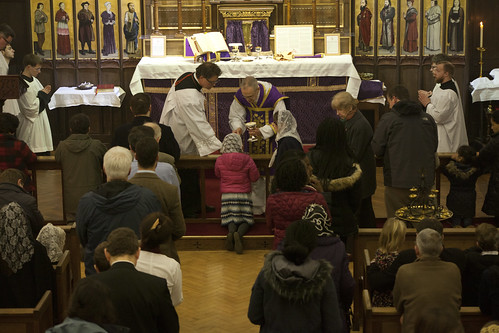 |
| Feed my sheep. |
Something I have mentioned a few times I can now make more explicit: what neo-conservatives have done to marriage.
Patriarchy involves rights and duties for both parties. Over the millennia, Christian and non-Christian versions of Patriarchy have given men the incentive necessary to get them to commit to spouse and family, that is, to provide their families with support and protection. Christian Patriarchy, taking inspiration from the mystical relationship between Christ and the Church, raises Patriarchy to a higher level, as grace builds upon nature, but the point of it, the incentive to men and the support and protection to women, remains. Grace builds on nature, it does not abolish nature. By connecting the traditional prerogative of authority to the authority of Christ, Christian Patriarchy tells us more about what that authority is for (the benefit of the family as a community), but emphasises even more that this authority is to be taken seriously.
Feminists and radical liberals are hostile to the very concept of the family, because the family passes on values without reference to the state, and totalitarians cannot tolerate this. But the conservatives of today have done something very strange as well. In response to the claim that Patriarchy is oppressive, their response has been: well ok, let's stress the duties of the husband to the wife, and the prerogatives of the wife over the husband, and ignore or even deny the duties of the wife to the husband, and the prerogatives of the husband over the wife.
Explicit denial of the authority of the husband over the wife can be found in neo-conservative online Catholic sources such as this and this; it is given at length in books like this. Such views are often linked to Christopher West, though I couldn't find a helpful discussion by him online. More authoritative treatments do avoid denying the teaching of the Church, and content themselves with being silent about the authority of the husband. This is what we find in the Novus Ordo liturgy, Pope St John Paul II's Mulieris dignitatem and his later Letter to Women, and the Catechism, whose determination not to mention husbandly authority goes to particularly contorted extremes.
This silence on the part of Pope St John Paul II carries over into his defence of the all-male priesthood. Obviously, the reason why priests must be men is connected closely with the role of men as representing Christ, in the home and in the liturgy. Indeed, while the New Testament does not give us an explicit rationale for the all-male priesthood, the roles of the two sexes in the economy of salvation is made clear in the context of marriage (in 1 Cor 11). JPII seems remarkably reluctant to appeal to this directly, however; rather, the strategy was to stress the 'spousal character' of women, coupled with the bare fact of Christ's decision to ordain men and an assertion of the Church's inability to ordain women. In this Mulieris dignitatem (1988) laid the groundwork for Ordinatio sacerdotalis (1994); the point was reiterated by the Letter to Women (1994).
Whether accomplished by explicit denial of the husband's prerogatives, or simply by silence about them, the picture conveyed to sincere Catholics seeking to discover the teaching of the Church on the matter is the same. They are offered half of the Patriarchal picture: the half that's of benefit to the woman, but without any of the quid pro quo for the man.
This extremely strange conception of marriage is then promoted to men in an equally strange way. To the complaint, explicit or implicit, that there is not much incentive to men to marry, and that the kind of man who accepts this settlement is a bit of a weed, they respond by pointing to all the Biblical passages and historical examples of Patriarchal men, such as those associated with Chivalry, and they say: look at these strong men. They are not weeds. What did they do? They served and protected women. You men who don't feel incentivised to marry: take inspiration from these men. Man up! And devote yourself to the service of women without thought of reward.
Again, the more authoritative (and theologically self-aware) the source, the more it is a matter of what they do not say, rather than of what they say. Their silence is filled in, however, by a small army of on-line neo-con apologists who neither know nor care that their weird way of reading St Paul is incompatible with the Fathers of the Church or a pile of Papal Encyclicals, and are themselves aided by non-Catholic social conservatives. Bishop Olmstead, therefore, can only be criticised for a lack of balance in his call for men to 'man up'. The distortion is more visible in this, and in a secular context in this.
Not only is there a degree of intellectual dishonesty here (and, theologically, an implicit denial of the teaching of the Church), but it is never going to work psychologically. Some generous souls may throw themselves into this idea, but for all their (perfectly genuine) service and suffering, they are never going to look like strong men, because they aren't behaving like strong men. They are simply allowing themselves to be exploited: they are doormats. It is impossible to establish a healthy relationship on that basis.
In the meantime, the attack on the family has turned the dating scene into a sort dystopian, Hobbesian State of Nature, where the incentives of Patriarchy on men and women alike do not exist. In this environment, prestige and sexual success belongs to men who have the aura of strength, without having any inclination to settle down and provide for a family: aloof alpha jerks. Men who want to do the right thing are guided by the neo-conservatives into behaviour which categorises them firmly as needy, wet, desperate beta men: weeds. The more these men try to aspire to the kind of 'strong male' proposed by the neo-cons, by stressing their willingness to suffer and serve, the more they are digging themselves into this hole.
The kind of advice generally given to young Catholic men is not just mistaken, it is grossly irresponsible. This is true whether it amounts to a fully-formed, weirdly distorted account of the marital relationship, or whether it is simply a matter of stressing one side of Patriarchy and pretending not to notice the other.
Liberals and neo-cons have created a social situation in which finding a good spouse is extraordinarily difficult. It will help, however, if we understand what is going on, and how our own behaviour and attitudes shape others' perceptions of us. We are also called on to accept and live by the teaching of the Church, even when this is not going to please everyone
Support the work of the LMS by becoming an 'Anniversary Supporter'.
Vespers of the Dead on All Souls Day, in Warwick Street, London
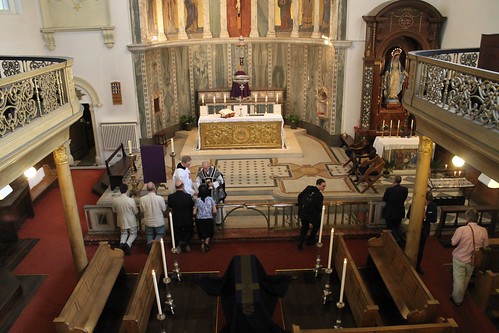 |
| Requiem for Michael Davies in 2015 in Warwick Street. |
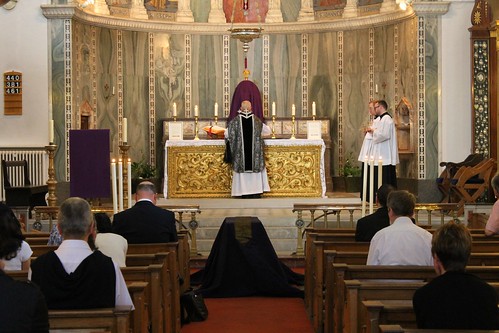
Support the work of the LMS by becoming an 'Anniversary Supporter'.
Juventutem London Mass on Friday 28th Oct
Support the work of the LMS by becoming an 'Anniversary Supporter'.
Amoris laetitia and the Bishops of Buenos Aires
I'm coming late to the party on this news, but I feel the need to think this through a bit by setting the matter out in a blog post. Everything in this post is, obviously, my personal opinion for which I don't claim any particular authority.
The saga of the interpretation of Amoris laetitia took a step forward with the publication of a letter addressed to priests from the bishops of the pastoral area of Buenos Aires, and the arrival in the public domain, somehow, of Pope Francis' response to that letter. This was an enthusiastic endorsement: 'The document is very good and completely explains the meaning of Chapter VIII of Amoris Laetitia,' he told them, adding: 'There are no other interpretations.'
The choreography of the letter and the Pope's response in the media leaves little doubt that the Pope wishes this to be seen widely as the correct interpretation of Amoris laetitia. I don't say it is an 'authoritative' interpretation since the Pope's letter to the bishops does not look like a magisterial act. What it does do, all the same, is give us a clearer take on Pope Francis' personal view than we have had up until now.
The key passage of the Bishops' letter is as follows. The possibility of a couple in an illicit union living in continence, as brother and sister, has just been raised. The letter goes on:
6) In other, more complex cases, and when a declaration of nullity has not been obtained, the above mentioned option may not, in fact, be feasible. Nonetheless, a path of discernment is still possible. If it comes to be recognized that, in a specific case, there are limitations that mitigate responsibility and culpability (cf. 301-302), especially when a person believes they would incur a subsequent wrong by harming the children of the new union, Amoris Laetitia offers the possibility of access to the sacraments of Reconciliation and Eucharist (cf. footnotes 336 and 351). These sacraments, in turn, dispose the person to continue maturing and growing with the power of grace.
It goes on to say that this concession should not be understood as of general application, but must follow from discernment and so on, and that the admission to Holy Communion might best be done in private.
To understand the significance of this we need to refer back to the passages of Amoris which are referred to, and clarify some of the operative concepts.
Mortal sin drives out sanctifying grace, which makes it impossible to receive Communion fruitfully. As I have discussed here, paragraphs 301-5 of Amoris about mitigating circumstances explicitly rule out of consideration the type of mitigation which can make an objectively gravely wrong action compatible with a continuing life of grace: viz., those factors which would stop the action being a mortal sin.
To be a mortal sin, an objectively gravely wrong action must be done with full consent of the will and with knowledge of its gravity. We can set aside the possibility that carnal relations between a couple in an illicit union are never engaged in with full consent, as if they were always intoxicated, victims of torture, or under the thumb of a cruel blackmailer. (These things are possible, but are not what Amoris has in mind.) The question comes down to knowledge of the moral gravity of the act. On this, Amoris (301) declares:
A subject may know full well the rule, yet have great difficulty in understanding “its inherent values”
This is important because as I have noted, the key type of case is that of 'churchy' people, who want to receive Communion, be godparents, and be on the Parish Council; people who in Germany and Austria pay the Church Tax. They cannot be said to be ignorant of the law: they know it 'well'; on the other hand they do not, subjectively, feel motivated to follow it -- they don't see 'its inherent values'.
Now, it is precisely because this type of case cannot be understood except as a mortal sin, that it has caused the problems it has. A couple who appear publicly to be in an illicit union but have managed to free themselves from the permanent state of moral sin by confession, and a firm purpose of living as brother and sister, can be given Communion in private, to avoid scandal to others. A person who, in the judgment of a confessor, has performed gravely wrong actions without full consent of the will or without knowledge of the gravity of the act, can be given absolution without a firm purpose of amendment, since he was never guilty of that particular mortal sin. These cases are not the problematic ones. The problematic case is that where the classical definition of mortal sin does apply, not one where it does not.
To take the matter forward we need to go beyond the text of Amoris, since the text does not, or at least not clearly, give us a solution to this problem. What we get is footnote 351, which appears in para 305, which I have discussed before. This says very simply that a person in an objective state of sin can be helped by the sacraments, which I took as a statement of the obvious. The sacraments exist to assist our salvation. The footnote says nothing about setting aside the normative conditions, set by Divine Law, for sacramental absolution or the fruitful reception of Communion. This, at any rate, was my 'pious' reading of the footnote in the light of the continuous teaching of the Church.
What the Argentine bishops have done is to take this reference to people being helped by the sacraments, in the context of a discussion of people in an on-going state of mortal sin (or: a subjective state which up to now would not allow a confessor to give absolution, or a pastor to give Communion even in private), and draw the conclusion that, since Amoris is telling us that such people should be helped by the sacraments, it follows that the rules (i.e. Divine Law) which govern the sacraments must be changed, or ignored, so that these individuals can receive the sacraments after all, without changing their own, subjective or objective, circumstances.
This of course is not new; it is the standard liberal interpretation of Amoris. What is new, or at least clearer than before, is that Pope Francis wants us to take this as the 'only interpretation' of Amoris. This fits in with his statement that Amoris makes a difference: it changes something. When asked if it did, he replied (on an aeroplane): 'I can say yes, period.' He then referred the assembled journalists to the interpretation of Cardinal Schönborn, who said, in an interview:
There is an evolution, clearly expressed by Pope Francis, in the Church’s perception of the elements that condition and that mitigate, elements that are special to our own epoch.
What the Argentine bishops' letter gives us is clear indication of exactly what the change is.
For the sake of completeness I should acknowledge that the supporters of the new discipline will say it is a matter of interpreting Divine Law, not changing it, and that Cardinal Schönborn made great play of the idea that the existing rules, in Canon Law and elsewhere, don't need to be changed because it was just a matter of realising that no rules could cover every case. These moves make no difference, however, since the perennial teaching of the Church, on such basic issues such as the nature of mortal sin, the Sixth Commandment, and the conditions for sacramental absolution, are perfectly clear and cover the disputed cases without any conceptual difficulties. It is precisely because these are not marginal cases that they can't be dealt with (to the satisfaction of those wanting change) using the resources of the existing rules and discipline, which has always allowed a role for the exercise of judgement by confessors and pastors, since the application of the law in hard cases is not a mechanical exercise.
We have here a difficult situation, to say the least, where at least a few points are clear.
1. As noted, the conditions under which a priest can absolve a penitent are set by Divine Law, since our Lord Jesus Christ established the sacrament and acts in it. No one seems to be suggesting that Confession be evaded, so this is a key sticking point. It is obvious that the Pope does not have the authority to change Divine Law.
2. The same is true of the fruitful reception of Holy Communion (determined by communicants' subjective state), and the duties of priests to avoid public scandal by giving public sinners Communion in public (determined by communicants' objective state). Theses things are set by Divine Law and can be changed by no human authority.
3. The Pope has not taught in a magisterial document that the Divine Law be changed, ignored, or radically reinterpreted, but he has made it clear non-magisterially that he wishes a magisterial document to be understood in that sense. This would not be a way of binding the consciences of Catholics even if Divine Law were not at stake. My 'pious' reading of footnote 351 noted above is still a possible reading of the document as a magisterial text, even if it is clear that my reading does not reflect Pope Francis' private views.
4. Although it is clear that what the Pope has indicated, in this roundabout way, is not correct, and not compatible with the teaching of the Church, there would be several more steps to go before we could say that the Pope is a heretic. Being a heretic involves stubborn adherence to error after the error has been pointed out by people with the appropriate authority. A process of 'warning' by, say, the College of Cardinals, and a subsequent reiteration of the error on the part of the Pope, would rule out possible misunderstandings of what this or that passage really means, on the part of both sides, give the Pope the opportunity to clarify or recant, and so forth. Such a process is quite unimaginable in the present historical situation of the Church. It just isn't going to happen.
5. What is going to happen is that some people will follow these hints of Pope Francis, and some will not. Time will go by and Amoris will remain an unclear magisterial document, and private letters of the Pope and interviews by Cardinal Schönborn will remain the expressions of private views.
6. The intensifying conflict and confusion will cause incalculable harm to souls.
Anyone, incidentally, who thinks that I have a record of interpreting Pope Francis in a hostile may want to read this.
Support the work of the LMS by becoming an 'Anniversary Supporter'.
LMS Pilgrimage to Wrexham
 There was a Missa Cantata at Wrexham Cathedral in Wales on Saturday for the LMS annual Pilgrimage to Wrexham in honour of St Richard Gwyn, a co-patron saint of the LMS.
There was a Missa Cantata at Wrexham Cathedral in Wales on Saturday for the LMS annual Pilgrimage to Wrexham in honour of St Richard Gwyn, a co-patron saint of the LMS.
The diocese of Wrexham is currently suffering considerable upheaval and church closures at the moment. It's great to see the Traditional latin Mass flourishing there.
Canon Scott Tanner was the celebrant and he brought with him a team of servers and singers from the Dome of Home.

